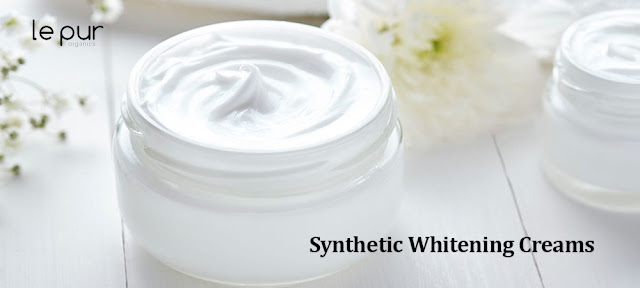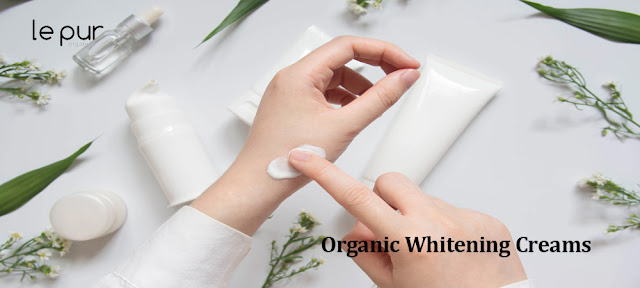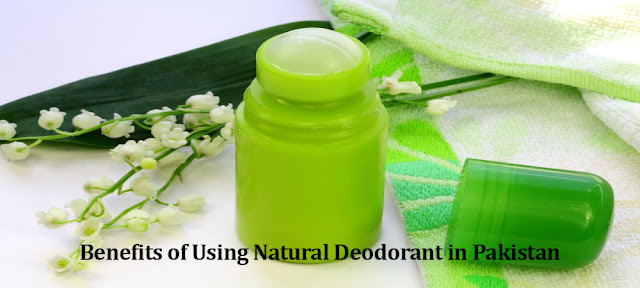Synthetic vs. Organic Whitening Cream: Which One is the Best for You?
There are a plethora of skin-whitening creams to choose from in today's cosmetics market. Organic whitening creams are available in both organic and synthetic varieties. There are advantages and factors to think about with each array. This essay aims to provide a comprehensive analysis of the differences and similarities between synthetic and organic whitening creams so that you can make an informed decision about which option is best for you.
Whitening lotions are all the rage since they help you get more transparent, smoother skin. It cannot be easy to choose a whitening lotion when synthetic and organic are available. Understanding each option's features, advantages, and caveats is crucial for making a well-informed choice.
Synthetic Whitening Creams
Constituents
Whitening creams made with synthetic components are created in a lab. Hydroquinone, kojic acid, and retinoids are common ingredients in such creams. Skin-lightening chemicals like these work by inhibiting the formation of melanin, the pigment responsible for skin color.
Results and Advantages
The effectiveness and speed of action of synthetic whitening lotions have made them extremely popular. Acne scars, hyperpigmentation, and melasma can all be reduced with their help. They may be more effective than natural options because of their well-crafted recipe. However, if you have sensitive skin, you must follow the instructions for use and see a dermatologist.
Organic Skin Whitening Creams
Constituents
Natural and plant-based substances are used in the creation of organic whitening creams. These creams utilize natural ingredients with skin-lightening qualities, such as botanical extracts, essential oils, and other natural components. Licorice root extract, arbutin, and natural vitamin C found in fruits and vegetables are all examples of such substances.
Results and Advantages
Organic whitening creams are safer and more natural than their chemical counterparts. They achieve their effects by reducing the formation of melanin, which results in a more radiant complexion. These creams typically contain a high concentration of antioxidants and other beneficial elements to the skin. Organic whitening creams are generally considered safer for long-term usage and appropriate for sensitive skin, but the results may take longer to become noticeable.
What Makes Organic Whitening Creams Different from Their Synthetic Counterparts
Whitening creams can be divided into two categories: synthetic and organic. Ointments can be categorised as organic (made from natural ingredients) or manufactured. Your choice will depend on your preferences and the nature of your skin problems.
Possible Risks and Effects
When choosing a whitening product, safety should always come first. When misused or over extended periods, synthetic creams may have a greater possibility for side effects such as skin irritation, redness, or dryness. On the other hand, Organic whitening creams are thought to be safer for sensitive skin. However, because people have different sensitivities, conducting a patch test before using a new product on your face is best.
Effects on the Environment
Organic whitening creams are a better choice for people worried about their environmental impact. Their environmental impact is lessened because they are produced with eco-friendly methods and packaged in recyclable materials. On the other hand, synthetic creams may require chemical procedures that add to environmental pollution.
Things to Think About Before Buying a Whitening Cream
Sensitivity and Skin Type
Knowing your skin type and sensitivity is essential when looking for a whitening lotion. Organic creams could be better for people with sensitive or easily irritated skin. Many synthetic creams have chemicals that can help those with oily or acne-prone skin.
Individual Preferences and Values
Which type of whitening lotion you use depends heavily on your beliefs and tastes. Some people prefer all-natural and organic items for ethical or ecological reasons, while others put a premium on speed and choose synthetic alternatives. When selecting a choice, keep your values and objectives in mind.





Comments
Post a Comment